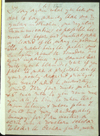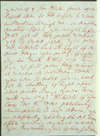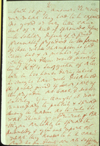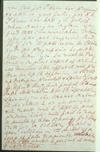Mahatma Letter No. 43
| Quick Facts | |
|---|---|
| People involved | |
| Written by: | Morya |
| Received by: | A. P. Sinnett |
| Sent via: | unknown |
| Dates | |
| Written on: | unknown |
| Received on: | January 1882 |
| Other dates: | unknown |
| Places | |
| Sent from: | unknown |
| Received at: | Allahabad, India |
| Via: | unknown |
This is Letter No. 43 in The Mahatma Letters to A. P. Sinnett, 4th chronological edition. It corresponds to Letter No. 42 in Barker numbering. See below for Context and background.
< Prev letter chrono
Next letter chrono >
< Prev letter Barker
Next letter Barker >
Page 1 transcription, image, and notes
|
I say again what you like me not to say, namely that no regular instruction, no regular communication is possible between us before our mutual path is cleared of its many impediments. The greatest being the public misconception about the Founders. For your impatience you cannot nor will you be blamed. But if you fail to make a profitable use of your newly-acquired privileges, you would indeed be unworthy, friend. Three, four weeks more — and I will retire to give room with you all, to him to whom that room belongs, and whose place I could but very unadequately occupy, for I am neither a scribe nor a Western scholar. Whether the Chohan finds |
|
NOTES: |
Page 2
|
yourself and Mr. Hume more qualified than he did before to receive instructions through us — is another question. But you ought to prepare for it. For much remains yet to break forth. You perceived, hitherto but the light of a new day — you may, if you try, see with K.H.'s help the sun of full noon-day when it reaches its meridian. But you have to work for it, work for the shedding of light upon other minds through yours. How, will you say? Hitherto of you two, Mr. H. was positively antagonistic to our advice, you — passively resisting it at times often yielding against what you conceived your better judgment |
NOTES: |
Page 3
|
— such is my answer. The results were — what they had to be expected. No good or very little came out of a kind of spasmodic defence — the solitary defence of a friend presumably prejudiced in favour of those whose champion he had come out and a member of the Society. Mr. Hume would never listen to K.H.'s suggestion of a lecture in his house during which he might have well disabused the public mind of a part of the prejudice at least, if not entirely. You thought it was unnecessary to publish and spread among the readers as to who she was. Think ye, Primrose and Rattigan are likely to spread the knowledge and give out reports of what they know to be the case? And so on. Hints are all sufficient to an intelligence like yours. I tell |
NOTES:
|
Page 4
|
you this for I know how profound and sincere is your feeling for K.H. I know how bad y'll feel, if when among us again you find that communication between you has not improved. And it's sure to pass when the Chohan finds no progress since he made him have you. See what the Fragments — the most superb of articles — has done; how little effect it will produce unless the opposition is stirred up, discussion provoked and spiritualists forced to defend their foolish claims. Read editorial in Spiritualist November 18, "Speculation-Spinning" — she cannot answer it as either he or you might and the result will be that the most precious hints will fail to reach the minds of those craving for truth for a solitary pearl is soon outshone in the midst of a heap of false diamonds, when there's no jeweller to point out its worth. |
NOTES: |
Page 5
|
So on again. What can we do! I hear already K.H. exclaiming. It is so, friend. The pathway through earth-life leads through many conflicts and trials, but he who does naught to conquer them can expect no triumph. Let then the anticipation of a fuller introduction into our mysteries under more congenial circumstances the creation of which depends entirely upon yourself inspire you with patience to wait for, perseverance to press on to, |
NOTES: |
Page 6
|
and full preparation to receive the blissful consummation of all your desires. And for that you have to remember that when K.H. shall say to you, Come up hither — you should be ready. Otherwise the all powerful hand of our Chohan will appear once more between you and Him. Send both portraits sent to you from Odessa back to H.P.B., the O.L. when you done with them. Write a few lines to the old Generaless to Odessa — for she sorely wants your autograph — I know. Remind her that both you belong to one Society and are — Brothers and promise help for her niece. |
NOTES: |
Context and background
Physical description of letter
The original is in the British Library, Folio 2. George Linton and Virginia Hanson described the letter in this way:
In bright red ink on three small sized sheets of thin white paper, each of a different size. The letter is unsigned but is in the M script.[1]
Publication history
Commentary about this letter
Notes
- ↑ George E. Linton and Virginia Hanson, eds., Readers Guide to The Mahatma Letters to A. P. Sinnett (Adyar, Chennai, India: Theosophical Publishing House, 1972), 92.





